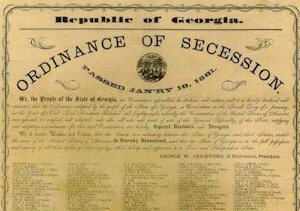On Secession
 | | As an individual, you are free to leave whenever you like |
Every so often in politics, the subject of secession--as defined as the breaking away of one government body from another to make two smaller bodies--comes up. As we have just reached the end of a long and bitter presidential campaign here in America, people all over the country are talking about it, handing out petitions, and drafting resolutions. Over at the White House's own "We the People" website, there have been petitions signed by tens of thousands of people all requesting the right of states to peaceably leave the Union. Those who take these calls seriously are few, but it is worth noting that America is a country founded by secession. It's in our DNA, as expressed most eloquently by the Declaration of Independence, the document our founding fathers used to separate from Great Britain. Over the last two hundred years, there have been several full-blown attempts to secede from the United States, most notably the Civil War, though none have actually worked.
What I'm trying to say is that today's call for secession is nothing new. It might be getting more publicity than such calls have gotten in the recent past (insert a discussion about the 24-hour news cycle and the Internet here), and it's entirely possible that this is slightly bigger than 1996 or 2004, but it still lacks any genuine traction and has already begun to peter out. Here's the thing, though: there could easily come a day when it gets the traction it needs to endure. People like to say our politics have polarized the nation, and that is true in some respects. If that polarization increases, it could create such divisiveness that secession might seem a reasonable course of action.
It won't be, though, not unless something fundamentally changes about our government. The genius of the American experiment is that it tries to put the government in the hands of the people instead of in the arms of a powerful elite. As it stands, we are still a representative democracy--we still have elections to decide who will lead us--and we still have power over our elected officials. Unless that equation is altered, secession would be utterly pointless. There are regional differences of opinion, but the union and compromise of those various perspectives is what makes America strong.
 | | It's not like we elected an intergalactic overlord as president, no matter what David Icke says |
I'm not trying to argue that revolution is a waste of time--I consider myself a Jeffersonian after all--but unless the States find themselves under the heel of a tyranny that will not relent, calls for revolution are just an infantile bit of whining that you're not getting your way. Besides, there's a big difference between revolution and secession, though they can often occur simultaneously. Revolution happens when the oppressed rise up against their oppressors, usually after trying and failing to come to fair reconciliation. In the case of America, our original revolution was a secession, but modern calls for secession are not calls for revolution, because nobody, as far as I can tell, is actively being oppressed.
In fact, to secede from America because you don't like the policies of the party in power is to oppress those within your population who voted for those policies. In other words, if Texas were to secede from the nation because President Barack Obama was re-elected, that would be disenfranchising the people in Texas who voted for him, which is not the same thing as liberating those who voted against him. Everyone was able to express his or her opinion in the ballot box, and it matters that Obama didn't get re-elected in a landslide. It also matters that those who disagree with Obama's agenda were elected or re-elected to other positions within the government, especially in the House. Those representatives are still fighting for the beliefs of the minority, and that is key. That's how the system works.
The Civil War happened because our founding fathers couldn't solve the problem of slavery, even though most of them recognized it as a problem. The balance of power between States and the Federal government was deliberately vague, but it needed to be addressed when slavery came to the forefront of American politics. When the dust settled, we held together (just barely) and became a stronger nation as a result. Say what you want about the economic perils of an increasingly progressive tax system or the bureaucratic ills of Obamacare, but these issues do not rise to the level of human slavery and are not so systemic that they require an irrevocable breaking of government. We do not, in other words, need another Civil War just because Barack Obama was elected to the White House for another four years.
 | | This didn't end well, is what I'm saying |
And make no mistakes; we are talking about war here. One should not expect secession to be a peaceful endeavor, and even if it happened in America today, it would be a bloody affair. Armed troops would land on American soil and shoot American citizens; neighbor would turn against neighbor; and the Federal government would do everything in its power to maintain control by almost any means necessary. By the end, families would be broken to pieces; the economy would be devastated; our national security and place in the world would be weakened; and many of our cities would lie in ruin. All for what, opposition to Federal funding for Planned Parenthood?
And then what? Even if a few states break away and form their own representative democracy, what's to stop the new nation from eventually forming an analog to the modern Democratic Party and voting in place the very same policies that started the whole mess to begin with? America endures through much trial and error. We were not a perfect union when we were founded and we never will be, but we are free to experiment at the whims of the American voter. We try new things all the time, and sometimes they fail. When they do, we try something else. If your political beliefs are strong, then you should have a little bit of faith in them working out in the long run. The worst thing that happens is that America stumbles upon a policy you never thought could work but does, and that hardly seems like a valid reason to get up in arms.
James Madison is one of the great geniuses of our political system, because he believed that America is an argument without end. It is through compromise and empirical example that men learn anything true, and as long as we are peacefully arguing with one another, we are still learning. As Madison put it in The Federalist #10, "As long as the reason of man continues fallible, and he is at liberty to exercise it, different opinions will be formed." So there is now a difference of opinion as to how our government should be run. I say that's a great thing. Let's keep it going.
-e. magill 12/4/2012
|
|